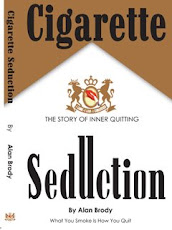It is hard to read this New York Times article with a straight face because the line-up of interests are so nakedly obvious: the FDA watching its turf, the drug co.s, the state taxes, the health groups with their self-righteousness and mysterious funding.
Nevertheless, the promises and challenges of a reconstructed, artificial cigarette are immense.
The bottom line – at least from the perspective of quitting the Cigarette Seduction way - is that when you take away the brand magic, and smoking is reduced to a nicotine delivery system, people find it easy to quit. Or at least cut down significantly.
There is very little magic in nicotine addiction. As drugs go, this one doesn’t do much for you. If you’re addicted you need it, and that's about it. Without the magic of a real cigarette and its brand power – you'll find that you don’t need all that much nicotine. And it will be easier to control. For the rest on how to jump the last chasm, I’m afraid you’ll have to read the book.
But since there are other issues raised by eCigarettes, I’ll answer them.
Yes, of course it is silly to argue that a product which tells you on the pack that it is deadly – cannot be replaced by something that may only be merely dangerous. But its a turf war – the FDA is only acting the way a government agency typically does while the lobbyists obviously represent drug companies that not only want to stave off competition but also possibly own this idea. Health groups – which should want the ameliorative possibilities of these cigarettes explored - just want cigarettes to go away. There is no place for discussion.
Like so much of the old economy, we have become boxed in by our usual thinking. Some version of the eCigarette was developed here about 10 years ago - Philip Morris' Accord and R.J. Reynolds' Eclipse (both had the idea but not the LED technology) and were quickly dropped, thanks to all the forces above plus the fact that no one really liked these devices.
So the eCigarettes were developed in Asia and at the same time, society changed: smokers became segregated and th eprice of cigarettes rose dramatically.
From the perspective of society however, the bigger issue is: do we want to sell a drug delivery system?
There are 2 answers. Wake up, we already do in – in many different ways from Ritalin to kids to Viagra and estrogen to adults.
We may also have a way to ensure that dangerous people who must take meds – do so: you addict them to the delivery system. Think of the mass killers who somehow went off their anti-depression medications…..if they were addicted to their meds, we wouldn’t have that problem……
The bottom line is:
1. Thanks to the internet, the people who want this product will easily beat the bureaucrats who don’t.
2. A cigarette without marketing magic is a product you can easily quit.
Wednesday, June 3, 2009
eCigarettes - My Comments in the Wall Street Journal
eCigarettes in the Wall Street Journal
It is laughable that a product that is labeled as deadly cannot be replaced by a product that may be merely dangerous. Especially when no one ever started smoking for their good health in the first place.
The truth is that smoking is really a form of psychological self-medication.
You could argue that’s true for the interested parties too: the FDA, the States, the drug and tobacco companies and even the Health Groups are far more interested in preserving their own point of view – and funding base - than actually helping smokers.
The really interesting thing is that when you deconstruct smoking – take out the branding and all the marketing hoopla – it comes down to an odd practice that people seem able to take or leave with ease.
It also brings us face to face with the idea that tobacco is explicitly a drug and yet we don’t seem to want to have that conversation.
Bottom line – when you understand why people smoke you’ll understand that they need more than a “just say no” approach.
The fact that we now have alternatives to the very old fashioned smelly cigarette is a plus. Back in 1907 public health groups actually praised cigarettes as a health benefit over spit tobacco! (But that was before cigarette taxes and TB was the big bugaboo.)
What we now know is that debranding practices always make it easier to quit or a least confront the psychic issues that underlie smoking - so people can much more easily move on with their lives.
Yet, as always, the so-called do-gooders don’t care much about whether you live or die, just that you do it their way.
It is laughable that a product that is labeled as deadly cannot be replaced by a product that may be merely dangerous. Especially when no one ever started smoking for their good health in the first place.
The truth is that smoking is really a form of psychological self-medication.
You could argue that’s true for the interested parties too: the FDA, the States, the drug and tobacco companies and even the Health Groups are far more interested in preserving their own point of view – and funding base - than actually helping smokers.
The really interesting thing is that when you deconstruct smoking – take out the branding and all the marketing hoopla – it comes down to an odd practice that people seem able to take or leave with ease.
It also brings us face to face with the idea that tobacco is explicitly a drug and yet we don’t seem to want to have that conversation.
Bottom line – when you understand why people smoke you’ll understand that they need more than a “just say no” approach.
The fact that we now have alternatives to the very old fashioned smelly cigarette is a plus. Back in 1907 public health groups actually praised cigarettes as a health benefit over spit tobacco! (But that was before cigarette taxes and TB was the big bugaboo.)
What we now know is that debranding practices always make it easier to quit or a least confront the psychic issues that underlie smoking - so people can much more easily move on with their lives.
Yet, as always, the so-called do-gooders don’t care much about whether you live or die, just that you do it their way.
Subscribe to:
Posts (Atom)

